
Atlas F1 Magazine Writer
Without much competition to speak of, Cristiano da Matta is 2003's Rookie of the Year. The amiable Brazilian made a solid entry into Formula One - even leading a Grand Prix in his first season. Atlas F1's David Cameron talked to the Toyota driver on his debut year, the differences between CART and Formula One, and where he sees his career progressing in the future
So he backed into the rookie honours, then, much as, his critics would have it, he backed into the CART championship the year before. All the good drivers were already gone they said, off to the IRL (along with most of the good teams) or to Formula One. And yet he took seven poles, seven wins on the way to one of the earliest season clinches in CART history against the likes of Michael Andretti, Bruno Junqueira, Dario Franchitti and Paul Tracy. And no one ever suggested that those guys are duds.
And yet he still felt the need to talk the championship up in the face of his impending move. "There's a bunch of guys over here that are a lot better than a lot of the guys that are in Formula One" he said. "If you are a real racer, your personal satisfaction is higher in CART," was another gem, along with "If you are a real racer, a real sportsman, then the personal satisfaction is much higher over here (in CART)."
That sort of talk doesn't win you many friends in Formula One, and fans of the sport outside of Brazil howled that he had no respect for his new home. Come the end of his first year in Formula One, however, and his position had softened:
DC: You've now completed your first season in Formula One – was it what you expected?
da Matta: "It was more or less what I expected – lots of ups and downs for myself and the team. We have to concentrate more next season to be consistent, but a lot of things for me were new. I learnt many things – I think (I've) already been through the steepest part of the learning curve. I have to keep learning, keep focused, keep pushing so I can learn everything as quick as I can and keep on improving, get the consistency we were looking for this year, get better results, points often and so on."
da Matta: "The racing is all the same – just driving different cars, competing against different people – but it's the same. Maybe for someone from the outside it is completely different, but for (the driver) who is driving the car, working with the team and concentrating on the result, concentrate on your driving – it's all the same thing. What is (going on) all around you, you don't see."
Toyota felt they owed him a shot at the big time for bringing home their first championship, and they announced at the final race in Suzuka 2002 that da Matta was joining Olivier Panis for the company's second year in Formula One as a reward for his efforts. Da Matta was thrown into a heavy testing programme over the winter off season to familiarise him with the car and the team, starting slowing and working his way up to the benchmark – his seasoned teammate.
So how long did it take da Matta to come up to speed? "We thought that the tests that the team (organised showed) I was able to learn a lot right from the beginning," da Matta stated in the Suzuka pitlane a year after that fateful announcement, at the conclusion of his eventful debut year in Formula One. "So I had a good feeling for the season, for Formula One, and for what I can do here quite early.
"Of course, I think it was mostly due to the amount of testing I did in winter – it was quite heavy, a lot of testing going on, and a lot of days in the car on the racetrack – so I was able to get through the new information, new things, and just get used to everything quick. It helped me a lot, and I think that's why right from the beginning of the season I had a good feeling about the season, about Formula One, and about what I could do here."
Da Matta started off with laptimes a long way off the pace of Panis, as can only be expected, and over the months brought his times down and down until they were comparable to his teammate, but laptimes don't necessarily reflect racing ability. If the slow build up was planned, then when did he feel he was at the right level for racing in Formula One? "Well from my point of view I think I'm still improving, I'm still learning, and that never stops. It's difficult to say – in the first race in Australia on the first qualifier I think I was pretty much already on the pace. Of course I've improved from there on, but I was at a stage already that was somewhat reasonable.
"When I started this year I didn't have any expectations – I thought it was too early to set some targets for the season. I think (only) somewhere in the middle of the season I thought maybe I would be able to end in the top ten of the championship. It didn't happen." Da Matta came 13th with ten points. "Together, driver and team, we made some crucial mistakes and crucial times, and we missed some precious points on many occasions. That's why we're not in the top ten."
The workload of Formula One drivers on a race weekend is remarkable – every team has a number of people employed to organise their timetables, to make sure that they are always doing something and get the best return from the hefty salaries the drivers enjoy. But how different is the workload between Formula One and the other categories of motorsport? "Well you see, you have to remember in CART there are twenty races, not sixteen, and a schedule that is not so well spread throughout the season.
"So some parts of the season you are a lot busier in CART than in Formula One, but in the beginning of the season, in March and April for example, you are much more busy in Formula One than in CART – that's the time you are traveling overseas to race – so it's quite tiring. At the end both series are quite demanding on you, and you have to be physically ready, mentally ready, focused, and really with a lot of gritted teeth."
There is an intrinsic difference between the cars in CART and Formula One – a Formula One car is lighter and nimbler than a CART, with a normally aspirated three litre V10 engine and traction control versus a turbocharged 2.65 litre V8 without traction control, for a start – and the previous CART transfers (most recently Juan Pablo Montoya and Jacques Villeneuve) have used the winter off season between the series to run an extensive training programme to get used to the new car.
Da Matta was no exception to the rule. But how different are the cars, and how differently do you have to train to drive them? "Driving a race car for me I don't think is physical at all," da Matta stated, "I'm used to doing things that are a lot harder than driving race cars!" Da Matta is a noted keen cyclist, competing in many bicycle and triathlon races as time permits.
"So for me maybe the Champ Cars are a little bit more physical on the shoulders, especially on the shoulder muscles because you don't have powersteering, and on the arms maybe are a big part too. Formula One is harder on the neck, but it's still nothing – the biggest enemy you have when you drive the race car is dehydration, and that's what you have to look at, at least for me when I drive the race car. I race bicycles - in the racecar I have the engine and everything else, so it doesn't give me any hard time!"
DC: What has been the best moment of your Formula One career so far?
da Matta: "For enjoyment definitely it was Silverstone – the race wasn't one of my best results but as much as I enjoyed that moment, that was the best for me – to lead a race."
DC: I guess you could say I'm here, I'm leading, I've made a mark
There have been a lot of low points for Toyota this year, as can be expected in any team's sophomore year – there were the problems with fuel vapourisation at the start of the season, and Monaco was as a tough weekend as well, with seemingly everything that could go wrong doing so over the weekend, at least for his teammate Panis. "Monaco - I had a good race there," da Matta gently corrects, "I finished ninth behind all the top four teams, so I had a good race – it was actually one of the races I quite enjoyed."
So what were the low points of the season for da Matta? "The low point is that I'm not going to be able to finish top ten – that is very … I'm disappointed. The most disappointing race was probably … let me think... maybe Monza – I qualified much worse than I thought, and I felt like I could have qualified (higher). And I didn't really do the race – I only had three laps and that was it."
Monza was a strange race for Toyota. It's no secret that the team has one of the most powerful engines on the grid, and as such a high speed track like Monza should have been manna from heaven. But it was not to be – both drivers struggled in qualifying, with Panis starting from ninth and da Matta twelfth – and they both suffered premature finishes due to mechanical gremlins.
Was there a specific problem that the team suffered in Monza? "No, no particular problem. Reasons - there are always reasons, but technical things we thought we were on the top of (arose) and we couldn't set them up properly for Monza." Whatever it was, the team sorted the problem out – they had three top four starts in the final two races of the year, which is useful to carry into the off season as the team prepares next year's challenger.
"We seem to be quite close to them sometimes, on some tracks but not everywhere, so if we can make it more consistent that we are just a bit behind them, and maybe even in some places if we can mix it with the top eight a little bit, that would be I think a great achievement for us for next season."
After the season da Matta returned to Brazil for a well deserved holiday and recharge, but returns soon to testing for next year. It will be a big change from last year's winter testing, so how will he approach the impending tests? "It's a completely different thing for me, because last year I came into the winter just thinking about myself, to learn how to drive the car as quick as I could and learning everything as quick as I could.
"Now probably my main concern is passing information to the team. I know what (parts on) the car will be important for performance during the season on certain tracks, when it's hot, when it's cold, so maybe I will be able to be a lot more specific and not only concentrate on my driving so much." The 2003 season proved that da Matta was worth his spot in Formula One, as well as showing that his team are quick learners. It would take a brave man to bet against the combination moving up the grid next year.
Cristiano da Matta, Formula One Rookie of the Year 2003. There's something no one expected to say when Toyota announced they were giving the amiable Brazilian his Formula debut as a reward for winning the CART championship for the Japanese car making giant last year.
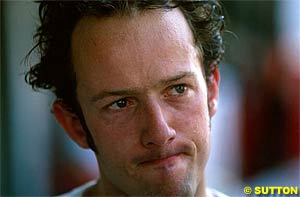 Of course, he didn't have a lot of competition for the title. Justin Wilson (2001 Formula 3000 champion, beating Mark Webber along the way, lest we forget) spent half the year at Minardi, half the year struggling with the poisoned chalice that is the green car next to the swift Australian, so he didn't have much of an opportunity to show his wares. Likewise for the man he replaced at Jaguar, Antonio Pizzonia. Ralph Firman had the unruly Jordan to deal with, along with the vastly experienced Giancarlo Fisichella as a teammate.
Of course, he didn't have a lot of competition for the title. Justin Wilson (2001 Formula 3000 champion, beating Mark Webber along the way, lest we forget) spent half the year at Minardi, half the year struggling with the poisoned chalice that is the green car next to the swift Australian, so he didn't have much of an opportunity to show his wares. Likewise for the man he replaced at Jaguar, Antonio Pizzonia. Ralph Firman had the unruly Jordan to deal with, along with the vastly experienced Giancarlo Fisichella as a teammate.
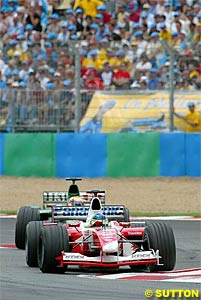 DC: How different have you found it from CART? The cars are different of course, but the racing, the organisation and everything – how different has it been?
DC: How different have you found it from CART? The cars are different of course, but the racing, the organisation and everything – how different has it been?
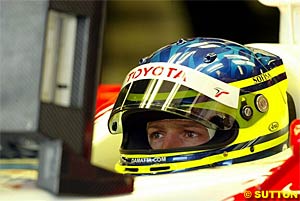 Moving from no expectations at all to being annoyed at not finishing in the top ten is quite a turnaround for a rookie in a team still wet behind the ears, but it's a reflection of how well da Matta came to grips with the sport.
Moving from no expectations at all to being annoyed at not finishing in the top ten is quite a turnaround for a rookie in a team still wet behind the ears, but it's a reflection of how well da Matta came to grips with the sport.
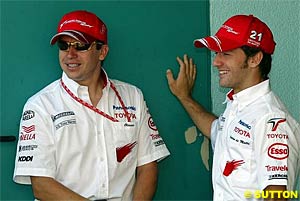 da Matta: "Yeah! It's not that it was only a few laps, and it's not that there wasn't anybody trying to pass me – I was not out in front and by myself – so with what I had in my hands I think I did what I could, and to lead a race is something that I haven't done much this year, not since last season, so it was just a good feeling to refresh my memories again."
da Matta: "Yeah! It's not that it was only a few laps, and it's not that there wasn't anybody trying to pass me – I was not out in front and by myself – so with what I had in my hands I think I did what I could, and to lead a race is something that I haven't done much this year, not since last season, so it was just a good feeling to refresh my memories again."
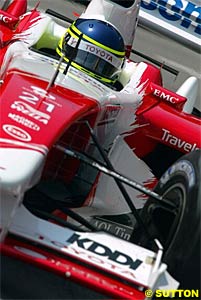 With the new car design well underway, what are your hopes for next year? "We have little bits going in the windtunnel now," da Matta confirmed, "and also we have the new engine running on the dyno – I've seen pieces of it, yeah. Our aim is to close the gap that separates the four big teams to us right now, try to be closer to them more often.
With the new car design well underway, what are your hopes for next year? "We have little bits going in the windtunnel now," da Matta confirmed, "and also we have the new engine running on the dyno – I've seen pieces of it, yeah. Our aim is to close the gap that separates the four big teams to us right now, try to be closer to them more often.
Please Contact Us for permission to republish this or any other material from Atlas F1.
|
Volume 9, Issue 49
Articles
In the Matter of da Matta
The French Revolution
Burning Rubber, Burning Oil
2004 Countdown: Facts & Stats
Columns
Rear View Mirror
Elsewhere in Racing
The Weekly Grapevine
> Homepage |